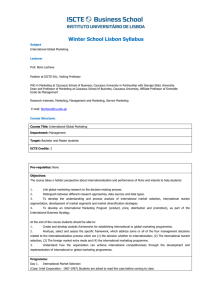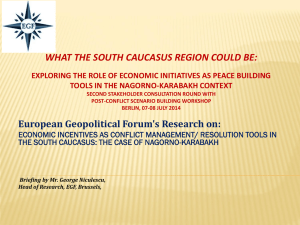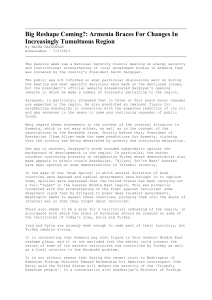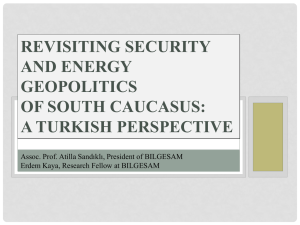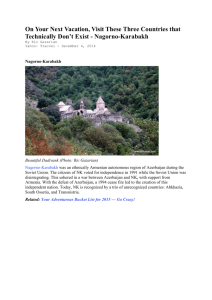Ethnic Variety in South Caucasus: Conflicts and Perspectives Tarana Shirvanova
advertisement
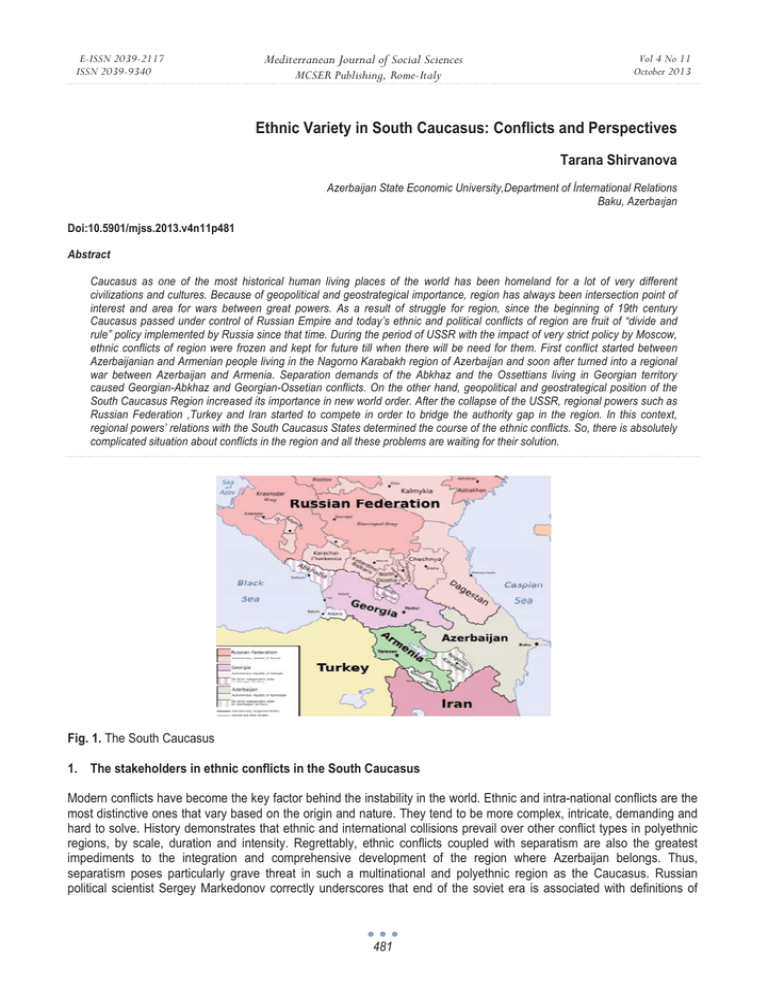
E-ISSN 2039-2117 ISSN 2039-9340 Mediterranean Journal of Social Sciences MCSER Publishing, Rome-Italy Vol 4 No 11 October 2013 Ethnic Variety in South Caucasus: Conflicts and Perspectives Tarana Shirvanova Azerbaijan State Economic University,Department of ønternational Relations Baku, AzerbaÕjan Doi:10.5901/mjss.2013.v4n11p481 Abstract Caucasus as one of the most historical human living places of the world has been homeland for a lot of very different civilizations and cultures. Because of geopolitical and geostrategical importance, region has always been intersection point of interest and area for wars between great powers. As a result of struggle for region, since the beginning of 19th century Caucasus passed under control of Russian Empire and today’s ethnic and political conflicts of region are fruit of “divide and rule” policy implemented by Russia since that time. During the period of USSR with the impact of very strict policy by Moscow, ethnic conflicts of region were frozen and kept for future till when there will be need for them. First conflict started between Azerbaijanian and Armenian people living in the Nagorno Karabakh region of Azerbaijan and soon after turned into a regional war between Azerbaijan and Armenia. Separation demands of the Abkhaz and the Ossettians living in Georgian territory caused Georgian-Abkhaz and Georgian-Ossetian conflicts. On the other hand, geopolitical and geostrategical position of the South Caucasus Region increased its importance in new world order. After the collapse of the USSR, regional powers such as Russian Federation ,Turkey and Iran started to compete in order to bridge the authority gap in the region. In this context, regional powers’ relations with the South Caucasus States determined the course of the ethnic conflicts. So, there is absolutely complicated situation about conflicts in the region and all these problems are waiting for their solution. Fig. 1. The South Caucasus 1. The stakeholders in ethnic conflicts in the South Caucasus Modern conflicts have become the key factor behind the instability in the world. Ethnic and intra-national conflicts are the most distinctive ones that vary based on the origin and nature. They tend to be more complex, intricate, demanding and hard to solve. History demonstrates that ethnic and international collisions prevail over other conflict types in polyethnic regions, by scale, duration and intensity. Regrettably, ethnic conflicts coupled with separatism are also the greatest impediments to the integration and comprehensive development of the region where Azerbaijan belongs. Thus, separatism poses particularly grave threat in such a multinational and polyethnic region as the Caucasus. Russian political scientist Sergey Markedonov correctly underscores that end of the soviet era is associated with definitions of 481 E-ISSN 2039-2117 ISSN 2039-9340 Mediterranean Journal of Social Sciences MCSER Publishing, Rome-Italy Vol 4 No 11 October 2013 "Caucasus" and "conflict" in the post soviet space. Caucasus has emerged as a corner of Eurasia with fierce ethnicpolitical conflicts and wars after the late 80's of the XX century. Six out of eight ethnic-political and civil conflicts of the post soviet space indeed erupted in the Caucasus . Those are Armenia-Azerbaijan conflict over the Nagorno Karabakh, Georgia-Osetiya and Georgia-Abkhaziya conflicts, civil war in Georgia, Osetiya-Ingushetiya war within Russia and Russian-Chechen conflict. Eventually, Caucasus has turned into a purveyor of separatist entities on the post soviet space. Although realization of separatist initiatives do not make political integration of various ethnic groups totally impossible it nevertheless complicates the matter. It is commonly known that breach of stability and increase of intranational tensions in the South Caucasus emanate from Armenia's territorial claims against Azerbaijan. Aggressive ethnicseparatist movement initiated by Armenia in Nagorno Karabakh has spurred perilous trends in the region, making the problem a global one. Ethnic extremism accompanied by separatism has turned into a curse for the South Caucasus. Interestingly, Armenian side attempts to justify the territorial claims against Azerbaijani lands (Nagorno Karabakh) with the slogan of self-determination (secession from Azerbaijan) for the Armenians of the Nagorno Karabakh. However, right for self-determination does not imply "right to secede" and must not be held equal to separatism. Unfortunately, international organizations and large countries that have assumed a mediation mission for the resolution of Nagorno Karabakh conflict fail to exert pressure upon Armenia, to coerce constructive position of this country, and to urge inadmissibility of manipulation of the notion of "self-determination". Problem is that due to their intra-national and ethnic nature unresolved conflict of Nagorno Karabakh negatively impacts similar regional conflicts. Prevention of those conflicts requires a better understanding and consideration of the peculiarities, history, ethnic composition and geopolitical situation of the region on the part of the Western states and international organizations interested in speedy resolution of the problem. Without due consideration of regional peculiarities and situation on the ground, any endeavor for resolution of the conflict is doomed to failure. First and foremost Caucasus has to be acknowledged as a unique region, an ethnic mosaic. It has distinctive ethnic, lingual, confessional and cultural diversity. Caucasus is often described as Babylon or the museum of nations. Representatives of 50 various ethnicities live each with indigenous culture and language live here. Thus, the very countries and organizations that condone Armenia's defiance with regards to the issue of self-determination must ask themselves a question: What would be the consequences for the Caucasus, should every nation and ethnicity demand this right in the form of separatism? Such resolution would undoubtedly serve as a precedent for other ethnic conflicts in the multinational region. This development would clearly contradict the interests of the region and the West. Some assert that since this region rests within traditional Russian sphere of interest this country aims to preserve the current situation for retaining the South Caucasus in its realm of influence. Accordingly, Russia is interested in maintaining "manageable instability" in the region. However, they seem to forget that "manageable instability" or other theories of conflict resemble the dangerous game of "playing with fire" because similar to fire any instability or conflict may get out of control and become difficult to tame. It would be sufficed to revert to Russia's recent history to show that this country is not insured from intra-ethnic conflicts either. Apart from Chechen uprising, Northern Caucasus had experienced other ethnic-national movements committed to the idea of "self-determination" or even "secession" in the 1990's. At the time, the Caucasian ethnicities forwarded initiatives to secede not only from Russia but also from republics with diverse ethnic population. Notably, in 1991 five entities were declared in just one Republic of Karachayevo-Cherkeziya, namely Karachay Republic, Cherkez Republic, Abaza Republic, Batalpashin Kazac Republic, Zelenchuk Urup Republic. Dire consequences of separatism are quite plausible in Russia, bearing in mind that this enormous and multinational country is not comprised of only the Northern Caucasus, aggravated by current geopolitical transformation in the Middle East and neighboring regions. In the meantime, the West has to be interested in the accelerated settlement of Nagorno Karabakh conflict as well as other regional conflicts, considering the critical role of the Caucasus in ensuring transit of energy, transportation and trade. Protraction of conflicts may obstruct implementation of large scale projects to be initiated by the West. The South Caucasus is one of strategically vital locations of the global geopolitics. Its prominence is solidified by the fact that direct access to Central Asia, beyond Russia and Iran, rests through the South Caucasus. Thus, in the environment of globalization and integration the West would hardly seek relations with tiny states in relatively small and volatile region. It is not just the economic and political interests that jeopardize the security of the Western states; unresolved regional conflicts may develop into a full scale war in the vicinity of Europe that already suffers from the financial crisis and uncertainty. Finally, regional states also ought to be interested in the resolution of conflicts they are involved in. Armed conflicts entailed human casualties, financial losses, economic hardship, expulsion of thousands of refugees and internally displaced persons and other tragedies. Unresolved conflicts negatively affect economic prospects as well as global and regional outreach of the concerned countries and hampers comprehensive realization of their potential. 482 E-ISSN 2039-2117 ISSN 2039-9340 Mediterranean Journal of Social Sciences MCSER Publishing, Rome-Italy Vol 4 No 11 October 2013 2. Legal aspects of the Nagorno-Karabakh conflict 2.1 Based on the laws and Constitution of the former USSR. On February 20 1988, a session of the Supreme Soviet of the Mountainous Karabakh Autonomous Region (Mountainous Karabakh region) appealed to the Supreme Soviet of Armenia, Azerbaijan and the USSR to allow it to be joined to Armenia. The Azerbaijani government quickly rejected this request on the basis of the USSR Constitution of 1977, Article 78 which provides that «The territory of Union Republics may be altered by mutual agreement of the Republics concerned, subject to ratification by the Union of Soviet Socialist Republics». This constitutional act of Azerbaijan was received in Mountainous Karabakh and in Armenia with hostilities against Azeris. Strikes and mass demonstrations were organized in order to exert pressure on the central government. However, on July 18, 1988, a special session of the Presidium of the Supreme Soviet of the USSR discussed the resolution of the Supreme Soviet of the Mountainous Karabakh region on secession from Azerbaijan and incorporation into Armenia and adopted a decision confirming that Mountainous Karabakh remains an Autonomous Region within Azerbaijan. The response to this decision in Mountainous Karabakh was again strikes and mass protests. All attempts of Azeri authorities to discuss possible solutions to existing problems in the Region with local Armenian authorities of Mountainous Karabakh were rejected. Representatives of the Azeri government visiting Stepanakert (Khankendi) to hold negotiations were attacked and beaten. On December 1, 1989, the Supreme Soviet of Armenia adopted a resolution on unification of Mountainous Karabakh with Armenia. Such a resolution violates Azerbaijani territorial integrity and makes the territorial claims official. The Autonomous Regions in the former USSR did not have constitutions as did Autonomous Republics, neither had the right of secession as did the Union Republics. The principles of granting autonomous status (Region or Republic) to the national minorities in the former USSR did not have any logical basis and their creation had more political aims rooted in imperialistic rule, than desire for protection of minorities rights. 2.2 Based on the Treaty of the Commonwealth of Independent States. After the coup d’état failure and the USSR’s collapse, Armenia and Azerbaijan as independent states entered the Commonwealth of Independent States. One of the major principles of the Commonwealth Treaty is inviolability of the borders of the constituent sovereign states, that is, territorial integrity. However, the Armenian population in Mountainous Karabakh held a referendum, declared the establishment of the «Mountainous Karabakh Republic» as an «independent» state and appealed to the Commonwealth for membership. This separatist action contradicts to the principles of the Treaty, signed by 11 sovereign republics, the Helsinki Final Act and International Law, and was not recognized by the Commonwealth or any other states of the world. 2.3 Based on International Law, OSCE and U.N. principles At the present time Armenia has changed its policy towards the Mountainous Karabakh problem. Former Armenian president Ter-Petrosyan and other officials stated that Armenia had no territorial claims to Azerbaijan and Mountainous Karabakh was the internal matter of Azerbaijan and the problem of self-determination of the Armenian population there. Even the official approach of the Armenian government changed, but the resolution on incorporation of Mountainous Karabakh still exists. Armenian officials say that it is not valid, but it was not annulled and officially still on the book. The deputies elected in Mountainous-Karabakh are still members of the Armenian Parliament and the Armenian soldiers are fighting on the territory of Azerbaijan and killing its citizens. Though Armenia’s authorities changed their strategy and stance on the problem, the facts show the volume of political and military interference of Armenia into internal affairs of the Republic of Azerbaijan. Armenians of Mountainous-Karabakh also changed their position at present stage of the conflict. At present time they do not voice their desire to join Armenia, but declare their goal to establish an independent state based on the principle of the peoples right to self-determination. In that case, it is very important to differ between the rights of «people» and the rights of «minorities». Armenians living in Azerbaijan are national minority, which has a mother-nation in Armenia. Karabakh Armenians have the right to internal self-determination, meaning the right to determine their status for effective participation in political, social, economic, cultural, religious and public life in Azerbaijan in a manner, which is not threatening the territorial integrity of Azerbaijan and its sovereignty. After the collapse of Russian Empire the 483 E-ISSN 2039-2117 ISSN 2039-9340 Mediterranean Journal of Social Sciences MCSER Publishing, Rome-Italy Vol 4 No 11 October 2013 Armenian people exercised their right to self-determination on the territory of present Armenia plus Zangesur, given to it by the Bolshevik government after the occupation of the two republics in 1920-21. The Armenian people achieved independence and their right to self-determination on the territory of the present Armenia again after the collapse of the Soviet Union in 1991. Strictly legal arguments against secession were summarized by Lee C. Burchett and include the following: - International Law is the law of states and not of peoples or individuals. States are the subject of international law and peoples are the objects of that law; - The so-called principle of mutuality; as states cannot oust a part of them, equally a part of a State cannot forcefully secede. How many times will the Armenian people exercise its right to self-determination by building independent states? Today they plan to do it on the territory of Azerbaijan; by this logic in the future it can took place in Georgia, Russia, even California as well. Armenian scholars emphasize that Mountainous Karabakh is a special case and Karabakh Armenians differ from the other Armenian communities outside of Armenia, as they had autonomous status, which is the starting point for self-determination and as a result of it, for secession. But the Autonomous Region of Mountainous Karabakh did not have the right of secession on the basis of the Constitutions of the former USSR and Azerbaijan. So, there is no legitimate difference in terms of secession, between Armenians of Mountainous Karabakh and Armenians living in compact communities in other countries. No doubt that Armenians living in Mountainous Karabakh in Azerbaijan or in the territory of other states are national minority and have the right to determine their status inside the states they inhabit, but should not take measures for its dismemberment. 3. The current status-quo in the Nagorno Karabakh conflict can lead to the war. The international community is trying to assure Azerbaijan to avoid the war for solution of the Nagorno Karabakh problem. But Azerbaijani President I.Aliyev stated many times that Azerbaijani people’s patience has its limits”. He said Azerbaijan couldn’t wait for endless continuation of the status-quo and would use all its rights and ways to restore its territorial integrity. “Therefore the international community, OSCE Minsk Group co-chairs insistently demand to change the status-quo, consider it unacceptable to save the status-quo and try to assure Azerbaijan to avoid other ways until the status-quo is changed. Azerbaijan is not a militarist state and has no views on somebody’s lands. Our main goal is to protect and ensure our state sovereignty, to restore territorial integrity and violated rights of the citizens and to establish peace in the region. Therefore Azerbaijan is trying to use the negotiation process and to reach the peacemaking process without using the military way. Otherwise Azerbaijan has the right to liberate its territories from the occupation by other means”.Azerbaijan is not going to compromise these rights. Because one of the two major principles of the fundamental law was depicted in the UN Charter after the World War II. This is the principle of territorial integrity and inviolability of the territorial integrity. Only with the permission of the state the territorial integrity can be changed, annexed to the territory of another state or independence can be given to the people living there. This principle is one of the major norms of the international law. The second principle was added to the international law later, especially after OSCE was established. This is the people’s right to self-determination. It is not written here that the people’s right to self-determination will result in the violation of the states’ territorial integrity. The rights of various peoples can be ensured within the framework of the states’ territorial integrity. There are examples. Peoples and nations get national autonomy within the framework of the determination of their rights. Within this autonomy they form their right to life, including their life style. The state as a geopolitical author, subject of the international law is a model having no alternative yet. Basing on this model we unambiguously put forward and support the principle of the inviolability of Azerbaijan’s territorial integrity. Armenia-Azerbaijan conflict will be solved basing on this right. 4. Azerbaijan has identified steps to develop post-conflict Karabakh Azerbaijan has reiterated that it is ready to grant the highest status available to Nagorno-Karabakh. But the essence and details of this status are not always disclosed. These details can be interesting and attractive for the Armenian community of Nagorno-Karabakh. As you know, one of the provisions of the Madrid Principles addresses the status of Karabakh. But it will be possible to grant a status only after Azerbaijani community returns to this territory and the surrounding districts are deoccupied. Azerbaijan can consider the issue of high status only after this takes place. Similar status is available in 484 E-ISSN 2039-2117 ISSN 2039-9340 Mediterranean Journal of Social Sciences MCSER Publishing, Rome-Italy Vol 4 No 11 October 2013 different parts of the world.For example, South Tyrol. It is a cultural autonomy and cultural status within the territorial integrity of the country. This is about both vertical and horizontal status. This status preserves subordination to the state in social, political and economic fields. There are also principles of independence. In this context, the principles of the entity that will be established in Karabakh should be discussed. True, as MPs, we don’t have a deep awareness of this matter. However, it is known that Azerbaijan already has great proposals and plans on post-conflict development of this territory. This territory belongs to Azerbaijan and it is responsible for socioeconomic development here. Azerbaijan has already identified financial and other matters that need to be settled to develop post-conflict Karabakh. All Armenians living there are citizens of Azerbaijan. The issue of their rights is a matter which will be settled under the laws of Azerbaijan. The concept of a status implies co-existence of both Azerbaijani and Armenian community in Karabakh. No one will be inferior or superior to one-another here.The preservation of national and cultural identify is very important here. The principles of existence of everyone within the country’s laws regardless of language, religion and national identity are paramount in Azerbaijan. This is not tolerance. Tolerance means endurance. We are people who stand above tolerance. We preserve identity and respect rights of people who co-exist together with us and try to help promote their national and moral values. This is the greatest principle that the Azerbaijani state is committed to. In this respect, the rapprochement between Azerbaijani and Armenian communities should move into mainstream. 5. Regional Cooperation of South Caucasus States: Illusions, Reality, Perspectives The South Caucasus is a region where a number of unresolved conflicts still exist in the absence of regional security arrangements. Indeed, three unresolved (Nagorno-Karabakh, South Ossetia and Abkhazia) conflicts of the South Caucasus can be considered as one of the most serious obstacles for establishing a regional security system.The article gives brief information about security problems of the region and analyzes the perspectives of the realization of regional co-operation. The South Caucasus region represents the most problematic region within the post-Soviet area in terms of regional security concerns. The regional security situation in the South Caucasus is best described as “security deficit,” a term used by authors of the Central Asia-Caucasus Institute at Johns Hopkins University(1). The security deficit stemming from the interrelated and unregulated security threats described above have plagued the region for a considerable time. The increasing importance of the South Caucasus in the aftermath of the anti-terrorist operation in Afghanistan and the war in Iraq have now made the security deficit a threat not only to regional security but to that of Euro-Atlantic interests as well. The need for institutionalized security arrangements to manage, reduce and if possible resolve the security threats in the region has become palpable. In fact, it is increasingly apparent that failure to provide security is impeding the building of viable sovereignty in the region. One may agree or disagree with these assumptions. However, it is hard to deny that the political situation in the Caucasus is unique, unstable and even hazardous in terms of the perspectives of the regional security. This fact has been highlighted in August 2008 during Russia-Georgia war which resulted Russia’s recognition of Abkhazia and South Ossetia as independent states. Today, security threats in the South Caucasus will remain serious, complex and urgent. At the center of these concerns are three protracted unresolved conflicts in Nagorno-Karabakh, Abkhazia and South Ossetia. These conflicts pose major risk to regional states, population and regional security as a whole. Clearly, conflicts fuel those new danger s that threaten the nations in the entire Euro – Atlantic space. Namely these are ethnic and religious extremism, international organized crime, human trafficking, illegal trade in drugs, and what is particularly perilous, the existence of uncontrolled territories, or the so-called “white spots”, which provide shelter to international terrorists and allow them to develop relevant infrastructure. Therefore, as a solution to the problems, it is extremely important to create hostility among the region states and others, which follow its interests in the region and aspire to keep the balance between their interests. How this cooperation can be achieved? If we get answers to this question, it will be possible for us to find a permanent solve to the problems in the region. 6. Regional Cooperation: Two approach However, despite the integration of the Caucasus supported by the world union, because of the objective and subjective reasons it remained as an abstract model. Despite several studies of the political and economic problems in the Caucasus, it is controversial to say Russia or the West will determine the future of the Caucasus. To be more accurate, it is an issue of correlation between the settlement of the conflicts and establishment of the cooperation based on the factor of time. The question is: should the cooperation be established before or after the settlement of the conflicts? There are two concepts for resolving the said dilemma. According to the first concept, the economic or any other type of 485 E-ISSN 2039-2117 ISSN 2039-9340 Mediterranean Journal of Social Sciences MCSER Publishing, Rome-Italy Vol 4 No 11 October 2013 cooperation should be embarked only once the problems are resolved. It will be right to start integration with Georgia and Azerbaijan, which have many common opportunities and facilities in the South Caucasus. In this point, the West farthest extending point of Turkey will directly be able to contribute to this integration. Armenia is the latest country to join integration process. Because Armenia has Nagorno-Karabakh problem with Azerbaijan, with the Armenians in Cavakheti region, it has a problem with Georgia. Therefore, without solving these problems, its entrance to the integration with other countries without obstacles is almost impossible. Although, they made rapprochement with Turkey, especially, on this issue, themselves are approaching reluctant because of the domestic political factors and pressure of the Diaspora. The position of Baku is mostly negative and fair towards trilateral regional cooperation. Azerbaijan has expressed its reluctance to collaborate with Armenia until the Karabakh conflict is resolved and all the occupied territories are returned to the Azerbaijan jurisdiction. The core idea of the second concept adopted by Armenia is that the paramount importance of settling the existing problems is accepted. Moreover, according to the concept, the addressing of the problems is the key issue for ensuring the regional security. The supporters of the second concept (Armenia) believe that the establishment and advancement of the cooperation between the conflicting sides would change the situation and create more favorable political conditions, reinforce the mutual confidence, change the mentality of the people and, hence, open new horizons for the peaceful and civilized settlement of the conflicts. As a being a party to blame for lack of economic and security cooperation intra-regionally, Yerevan has proposed that regional cooperation should start from the formulation and accomplishment of concrete doable tasks. Karapetian, formulated the position of Yerevan as follows: ’Armenia believes that close cooperation in the region, whether political, economic or security-based, will help to bring lasting stability and prosperity based on a sense of solid and shared emergent values’. Today when Russia is rethinking its role in world affairs, given the weakening of its economic and military capacities, Armenia has not got leeway in making its choices. 7. The Best Example of Regional Cooperation: Azerbaijan and Georgia The contemporary example of strong regional partnership between Azerbaijan and Georgia, two nations with very different dominant ethnic and religious groups, shows that not only a cooperative arrangement within the South Caucasus is possible, but also that it is, clearly, in the interest of its participants. Moreover, the Azerbaijani-Georgian cooperation has had a strong impact on the wider region, among other things, the largest infrastructure project, the BakuTbilisi-Ceyhan, or BTC, pipeline, and by having served as the core for the GUAM, the Organization for Democracy and Economic Development. Such cooperation is not based on history, but rather on the ability of both Baku and Tbilisi to overcome existing obstacles for a vision of a common future of the Caucasus. For the South Caucasus’ common future to be fully realized, however, Armenia must be a part. Presently, Armenia stands largely separate from its two Caucasian neighbors and, unable to develop relations with Turkey, generally, acts more as an observer rather than a participant in the emerging partnerships in the region. It seems that if Azerbaijan and Georgia are fixated on the regional future, the Armenian thinking is still preoccupied by its past. Thus, not much room is left for thinking about the present; perhaps, a common trend for transitional periods. As the regional projects expand and develop further, Armenian non-participation increasingly turns into a limitation for integration in the South Caucasus as a whole and destructive isolation for Armenia itself. Should the current tendency of entrenching positions both in Baku and Yerevan continue, with time it might be even more difficult to bridge the differences and help Armenia to become a fully integrated member of the South Caucasus region. Comprehensive integration in the South Caucasus, thus, can be achieved through the formulation and acceptance of a common political identity based on the interests of the Caucasian states and their citizens. However imperfect, Azerbaijani-Georgian relations provide evidence for the feasibility of such integration and a model of recognition through the accommodation of both the interests of the individual states and of the entire region. Another important element of the partnership between Baku and Tbilisi is the ability to overcome mutual historic and more recent emotional grievances as well as an understanding that all unresolved issues could be addressed through bilateral negotiations. Arguably, only such accommodation can serve as the basis for sustainable regional identity. One psychological factor that seems to underpin any such identity is the appreciation of the Caucasus being a common neighborhood for all of its citizens. Without an appreciation of this commonality, a regional cooperative arrangement is not likely to be effective. As it seen, the integration process in the Caucasus will be realized gradually, with extremely difficult and slow steps. Some differences in the process of integration of the Caucasus may occur, that is to say, the targets for the previous stages may be realized in the latest stages or the opposite. 486 E-ISSN 2039-2117 ISSN 2039-9340 Mediterranean Journal of Social Sciences MCSER Publishing, Rome-Italy Vol 4 No 11 October 2013 8. Conclusion The relatively South Caucasus has become a zone of widely spread confrontations and conflicts. Very often many countries, including the powerful states, pursue their own political, strategic and economic goals at the expense of the interests of the other countries; it became evident that the idea of establishing cooperation between the countries of the South Caucasus region is a more unrealistic but need to consider some ideas. Below some ideas on ensuring security and cooperation in the South Caucasus region are given in light of the current political situation and balance of forces: First: The regional security and realization of cooperation should base on the two "No"s: a) “No” to engagement of quasi states to the cooperation process between interstates; b) “No” to the apply the Kosovo case as a solution mechanism for the exciting conflicts in the South Caucasus region; Second: The realization of cooperation should base on the two “Yes”s: a) “Yes” to more effective Western engagement to the peace negotiation process of Nagorno-Karabakh, Abkhazia and South Ossetian conflicts; b) “Yes” to restoration of territorial integrity of Azerbaijan and Georgia. Third: While the old conflicts occupy the minds of policy-makers in South Caucasus and in the international organizations, more efforts should be made to prevent new potential inter-ethnic conflict from erupting. Four: This should be taken into account that the region faces potential threats as spill over of insecurity from neighboring regions, particularly the Russian North Caucasus and a prospect of future conflict in Iran over its nuclear programmer would have a detrimental affect on the South Caucasus region. Five: Support for an immediate and effective cease-fire including an active commitment by responsible local commanders to its implementation. Six: In the long run development of regional cooperation initiative between all regional states – along the lines of Turkish initiative for Regional Stability and Cooperation Platform which includes 3 South Caucasus state plus Russia and Turkey – should be encouraged. In the short term it is important to support integration of regional states in wider initiatives and organizations such as Black Sea Economic Cooperation (BSEC) and OSCE. Seven: Convening of the international conference on security problems of South Caucasus under the auspices of OSCE (or EU) with the participation of the three South Caucasus republics and regional players (Turkey, Iran, Russia). The purpose of the conference would be the determination of the fundamental solutions to the aforementioned problems which would be mandatory and universal for everyone. Eight: Full support initiatives within the framework of the EU “Eastern Partnership” new program consultations on regional cooperation perspectives contribute to the pursuit of optimal regional security architecture in the South Caucasus. But, after analyzing current situation it will be easy to discuss EU’s attempt’s efficiency. To sum up cooperation and effective regional security system, the Southern Caucasus has come to the crossroad. Either region will begin to integrate into Europe, anchor into the Euro-Atlantic security system and develop into an effective barrier to the proliferation of terrorism, extremism, drug trafficking and organized crime or there will be a wholesale deterioration of security and a new gateway to Europe will open for ethnic conflict, terror and insecurity. References Svante E. Cornell,Roger N. McDermott,William D. O’Malley,Vladimir Socor, S.Frederick Starr, "Building Stability in the South Caucasus: The Role of NATO and Multilateral Security Organizations," Central Asia-Caucasus Institute, The Johns Hopkins University; Apr.21, 2004 Libaridian, G. J. (1997, June 23). The Politics of Promises. Conference titled the Transcaucasus Today: Prospects for Regional Integration. Karapetian, V. (2001). Some Aspects of Foreign Policy in Armenia: an Armenian View of Regional Economic Cooperation as a Prerequisite for the Establishment of a Stable and Secure Environment in the Caucasus. In P. Hardouin, R. Weichhardt & P. Sutcliffe (Eds.). (2001). 487
